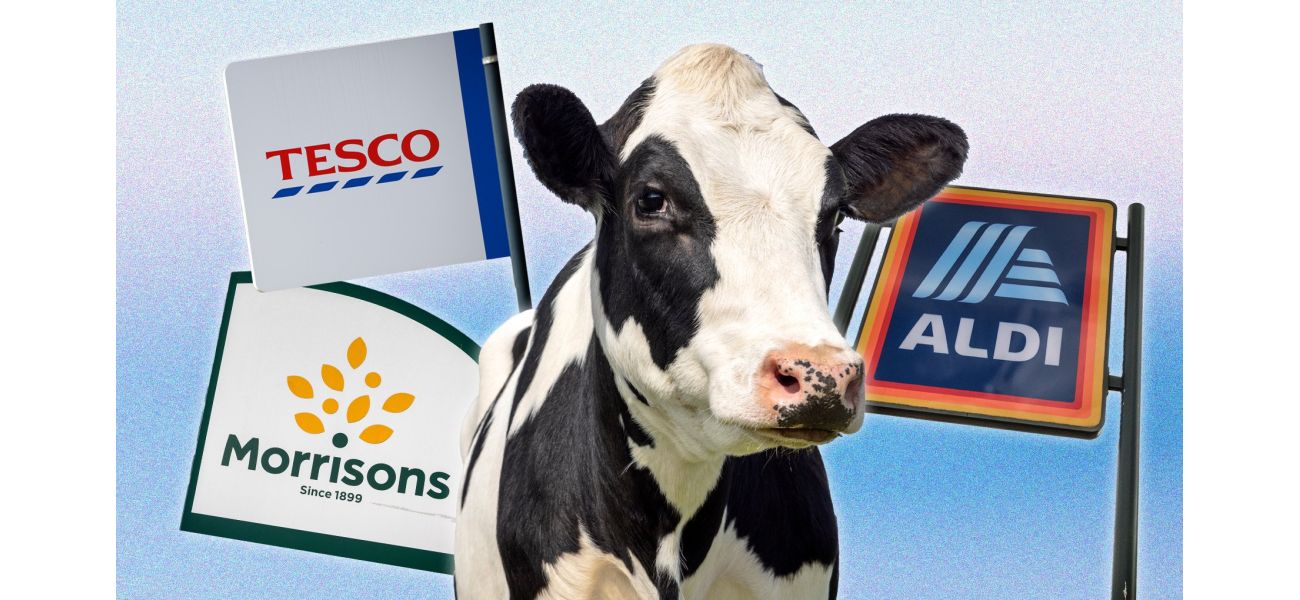Supermarket chains Tesco, Aldi, and Morrisons are at risk of a boycott due to the presence of a contentious ingredient in a well-known dairy brand.
Morrisons, Aldi, and Tesco sell Arla products, like Lurpak and Cravendale milk, and will test Bovaer-fed cow products.
December 2nd 2024.

Morrisons, Tesco and Aldi are three of the major supermarkets in the UK that carry products from dairy giant Arla. These products include popular brands such as Lurpak and Cravendale milk. However, there is now talk of a potential boycott of these supermarkets due to concerns over an additive that will be used in the feed of cows that produce milk for Arla products.
The additive, called Bovaer, is aimed at reducing greenhouse gas emissions from cows. Methane, a potent greenhouse gas, is produced by cows through their digestion and contributes significantly to global warming. While the UK Food Standards Agency has deemed Bovaer safe for consumption, many customers are still unhappy with the news that Arla will be trialling its use on 30 farms.
In a post on social media, Arla stated that Bovaer has the potential to reduce emissions from cows by 27%, making it a valuable tool in addressing climate challenges. However, this announcement was met with backlash from customers, with over 13,000 replies expressing concerns and even vowing to boycott Arla products and the supermarkets that carry them.
Some customers have raised valid questions about the long-term health effects of consuming products from cows fed with Bovaer, as well as the lack of choice given to consumers. Arla has also had to clarify that any claims of Bill Gates' involvement with the additive are false, although the billionaire has invested in a company that develops similar products.
Interestingly, Bovaer has already been approved for use in several other countries, including the United States, Canada, Brazil, and Chile. In the EU, it is only approved for use in dairy cows. This has led to discussions about the potential benefits and drawbacks of using Bovaer, with the National Farmers' Union Dairy Board Chairman expressing hope that the trial with Morrisons, Aldi, and Tesco will provide more evidence and confidence for farmers to use the product.
While Bovaer may have the potential to reduce greenhouse gas emissions, there are still questions about its long-term efficacy and impact on animal health and welfare. This highlights the need for a collaborative approach between retailers, dairy companies, and farmers in addressing climate challenges in the food system. Morrisons, Aldi, and Tesco have all stated their commitment to working with Arla to find sustainable solutions for reducing emissions. It is clear that a thorough and evidence-based approach is necessary in implementing any new products and practices in the dairy industry.
The additive, called Bovaer, is aimed at reducing greenhouse gas emissions from cows. Methane, a potent greenhouse gas, is produced by cows through their digestion and contributes significantly to global warming. While the UK Food Standards Agency has deemed Bovaer safe for consumption, many customers are still unhappy with the news that Arla will be trialling its use on 30 farms.
In a post on social media, Arla stated that Bovaer has the potential to reduce emissions from cows by 27%, making it a valuable tool in addressing climate challenges. However, this announcement was met with backlash from customers, with over 13,000 replies expressing concerns and even vowing to boycott Arla products and the supermarkets that carry them.
Some customers have raised valid questions about the long-term health effects of consuming products from cows fed with Bovaer, as well as the lack of choice given to consumers. Arla has also had to clarify that any claims of Bill Gates' involvement with the additive are false, although the billionaire has invested in a company that develops similar products.
Interestingly, Bovaer has already been approved for use in several other countries, including the United States, Canada, Brazil, and Chile. In the EU, it is only approved for use in dairy cows. This has led to discussions about the potential benefits and drawbacks of using Bovaer, with the National Farmers' Union Dairy Board Chairman expressing hope that the trial with Morrisons, Aldi, and Tesco will provide more evidence and confidence for farmers to use the product.
While Bovaer may have the potential to reduce greenhouse gas emissions, there are still questions about its long-term efficacy and impact on animal health and welfare. This highlights the need for a collaborative approach between retailers, dairy companies, and farmers in addressing climate challenges in the food system. Morrisons, Aldi, and Tesco have all stated their commitment to working with Arla to find sustainable solutions for reducing emissions. It is clear that a thorough and evidence-based approach is necessary in implementing any new products and practices in the dairy industry.
[This article has been trending online recently and has been generated with AI. Your feed is customized.]
[Generative AI is experimental.]
0
0
Submit Comment





